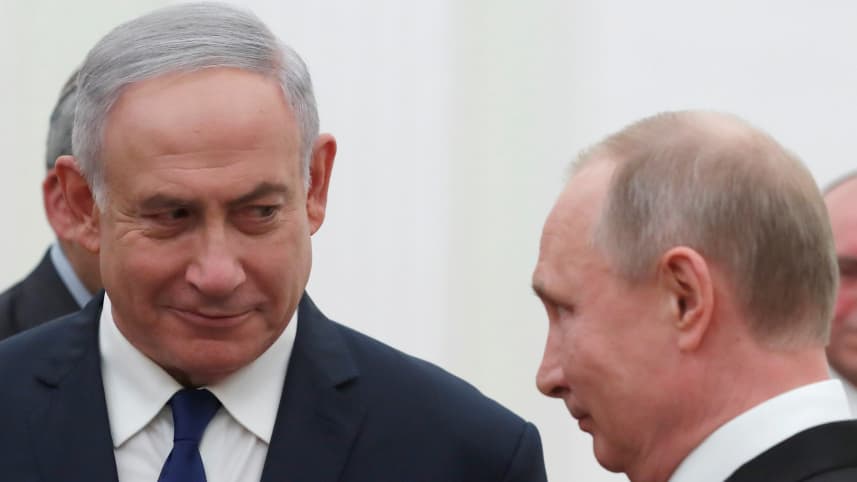Syria Strike: On Eve of Moscow Meeting, Netanyahu Sends Putin Strategic Message
عاموس هاريل من الهآررتس: الضربة الجوية الإسرائيلية أمس لمطار تيفور في سوريا الذي تستعمله إيران هي رسالة استراتجية من نيتانياهو لبوتين عشية لقائهما
Amos Harel/Haaretz/July 09/18
The attack attributed to Israel on the T4 airbase signals it’s willing to defend its interests in Syria, no matter what.
Sunday night’s aerial attack on the T4 airbase in Syria, near the city of Homs, was the third to have been ascribed to Israel at that site this year.
In February, the command-and-control center from which Iran sent a drone into Israeli airspace from Syria was bombed, and, in April, an Iranian aerial-defense system was blasted shortly after it arrived in T4. There have been other reports, never verified, of raids on arms supply convoys. In recent weeks, Syrian reports have blamed Israel for additional air raids, including one near the border with Iraq in which dozens of Shi’ite militiamen, funded by Iran, were killed.
Based on experience, Israeli will opt to attack in two possible contexts. The first is tactical: to hit a new arms shipment, or a weapons system that is about to be deployed. Israel has openly expressed concern about efforts by Iran to introduce such systems to protect its future military entrenchment in Syria, and has vowed to thwart such ambitions.
The second context is to send a strategic signal. The latest attack happened during the very week in which the Assad regime, assisted by Russia and Iran, advanced toward regaining its control over southern Syria, and its return to the country’s southwest corner, its Golan Heights.
The fact that the bombing was carried out three days before Prime Minister Benjamin Netanyahu is due to meet with Russian President Vladimir Putin in Moscow sends a message. Israel (assuming it is indeed behind Sunday’s attack) is determined to protect its interests and is not afraid of Russian reservations or an Iranian reaction.
In contrast to information leaked from Israel and to Russian insinuations in recent months, there is no new political arrangement in southern Syria. In practice, Israel has come to terms with the return of the Assad regime and insofar as is known, does not intend to intervene on behalf of the local rebel militias operating in the villages not far from the border with Israel’s Golan Heights. Israel remains focused on its declared interest: expelling the Iranians and their militias from all Syrian territory – particularly in the south.
Moscow has hinted that it will act to keep the Iranians 80 kilometers away from the border, but the degree of its commitment to doing so remains unclear, even though both Russian officials and Syrian President Bashar Assad seem less keen on collaborating with Tehran than in the past. Evidence of that is the fact that Russia seems to be making peace with attacks that have been attributed to Israel against Iranian targets in Syria (there was yet another exchange of hostilities on May 10 – hours after Netanyahu returned from his last visit to Putin).
Israel’s claim, which Netanyahu keeps repeating lately, is that it is not enough to draw an artificial line in the sand dozens of kilometers away from the border with Syria. Iran’s weapons have longer ranges than the distance Russia is prepared to take into consideration. Israel declares that as long as there is any Iranian presence in Syria, even indirect, it feels threatened. Netanyahu is thus presenting a far-reaching demand – and signaling that he means to try to enforce it, despite the not-insignificant risks involved.
In the background is Israel’s ongoing failure to handle a similar threat, from Hezbollah, during a period of over 20 years. Hezbollah’s arsenal of rockets and missiles has grown, encouraged and funded by Tehran, from hundreds at the end of the Israel Defense Forces’ Grapes of Wrath campaign in 1996, to about 13,000 on the eve of the Second Lebanon War, a decade later, to more than 100,000 today.
In Jerusalem they still think that the new Iranian threat from Syria can be destroyed while it is still emerging.
On the other hand, there are assessments in Israel to the effect that, despite the developing domestic Iranian dialogue, the commander of the Iranian Revolutionary Guards’ Quds force, General Qassem Soleimani, is determined to continue the project of Iran’s military entrenchment in Syria. He sees Syria as a jumping-off place for fighting Israel over time. At the same time, Soleimani and his people are assisting Hezbollah in improving the efficacy of its arsenal of guided missiles and rockets in striking infrastructure targets in the Israeli home front.
Jerusalem describes the effort to thwart Iran and Hezbollah, supported by the Trump administration, as a national strategic interest. When Netanyahu returned from Moscow on May 10, Soleimani ordered his forces to fire rockets from Syria at IDF outposts in the Golan Heights. The attacks failed and some of the rockets were intercepted by the Iron Dome batteries. Israel responded by bombing additional Iranian targets.
For a second Soleimani seemed to be blinking, but now it’s become clear that Tehran is persisting. And that is the background to the Israeli intelligence assessment that’s taking shape ahead of 2019: The probability of a pre-planned war against Israel seems very remote. On the other hand, the danger of an unanticipated deterioration of the situation, following exchanges of blows in the north, or in the Gaza Strip, is even higher than it has been in the last two years.



















